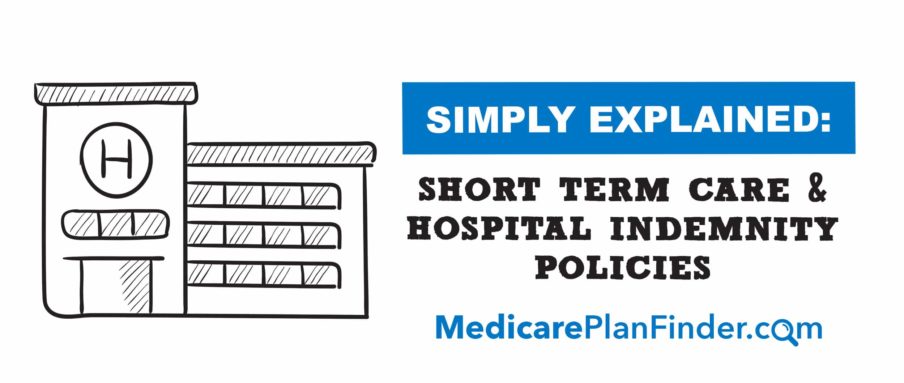
A Guide to Hospital Indemnity Insurance
May 30, 2019Medicare is a great resource for covering your healthcare costs, but it doesn’t cover everything. Are you spending more on hospital visits than you can afford? Are you or a loved one going to need assisted living or nursing home care soon?
Those services can be extremely expensive, and additional insurance coverage can provide the safeguard you need. Consider discussing ancillary products for short-term care and hospital indemnity insurance with your licensed agents
What Is Short-term Care Coverage?

Short-term care insurance is designed to provide hospital coverage for one year or less. Short-term plans are recommended for people who may become severely ill or injured or for anyone over 80.
These policies are especially beneficial for anyone staying in a nursing home or using an assisted living program. It can also help if you missed open enrollment and have to wait another year to apply for Medicare.
Pre-existing conditions will usually not affect your short-term care insurance. Premiums will rise with your age, so it’s important to get coverage early. Short-term coverage works fast; you can start receiving benefits as soon as the day after purchase.
Make sure to speak with an agent about your health conditions and your current coverage to determine if you need the extra coverage that short-term care insurance provides.
What Is Hospital Indemnity Coverage?
The word indemnity means protection from financial liability such as hospital expenses. Ancillary hospital indemnity policies are the best, cheapest way to save your piggy bank in the event of a hospital stay.
The average cost for one night in the hospital is between $1500-$3000 before any additional drugs or procedures that may be a part of your stay. The average hospital stay for seniors is 5.5 days.
Hospital indemnity plans can help make up for hundreds of dollars that you may be charged in the hospital. Your plan will have a set limit on the length of time you can spend in the hospital.
Hospital indemnity coverage can cost you as little as $12 per month depending on your financial needs and your potential for lengthy hospital stays. If you have or are eligible for a $0-premium Medicare Advantage plan with a high deductible, hospital indemnity insurance will help you cover those deductibles.
Everyone is eligible for hospital indemnity coverage, and your pre-existing conditions will not affect your ability to extend your coverage. One important note about hospital indemnity insurance is that you may have to wait for benefits used towards illnesses, but you most likely will not have to wait for accidental injury coverage.
How Does Hospital Indemnity Coverage Work?
To receive your benefits, you will need to make a claim immediately following your hospital stay, stating your expenses. You will receive a check directly in the mail from your carrier for a predetermined cash value (per hospital day).
For example, if your hospital copay is $400, you will need to pay $400 directly to the hospital. Your insurance carrier will then reimburse up to a certain amount, say, $250 depending on the specifics of your plan.
Since your reimbursement comes in the form of a check, you can use your hospital indemnity coverage for any services that you may need. Hospital costs are not limited to what shows up on your overnight bill. Consider the following additional costs:
- Laboratory and radiology tests
- Ambulance transportation
- Emergency room costs
- Outpatient surgeries
- Hospital parking for you and any visitors
- Post-hospital skilled nursing facilities
You can purchase hospital indemnity coverage at any time, but the closer you are to your Initial Enrollment Period (within the seven months surrounding 65th birthday), the lower your costs will be.
Start by setting up an appointment with your agent to discuss your options for ancillary insurance products that your Medicare plan does not cover.
Hospital Indemnity Insurance for Medicare Advantage
Private insurance carriers offer Medicare Advantage (MA) plans to cover many services Original Medicare does not. MA plans can offer coverage for services such as vision, dental and hearing in addition to hospital coverage and doctor’s appointments.
Hospital services, however, can still come with expensive copayments. You can use an indemnity policy to help relieve your out-of-pocket expenses and stay within your budget. Hospital indemnity coverage gives you a safety net to use in the event of a medical emergency.
Indemnity Plans vs. PPOs and HMOs
A PPO (preferred provider organization) is a type of health insurance plan. It differs from a HMO (health maintenance organization) in that with PPOs, you don’t need to select a primary care provider or get a referral if you need to see a specialist.
Indemnity plans are different from PPOs because indemnity plans are not primary health insurance. For example, your PPO or HMO will often come with preventive services such as an annual wellness visit. Hospital indemnity insurance plans only reimburse all or part of your costs related to short-term care.
We Can Help You Find Hospital Indemnity Insurance Coverage
Hospital insurance can mean the difference between having huge hospital bills or paying a manageable premium and a deductible if you use hospital services.
A licensed agent with Medicare Plan Finder can help you find the policy you need to cover your healthcare needs. Call 844-431-1832 or contact us here to arrange a meeting today.
This post was originally published on April 06, 2017, by Anastasia Iliou and was updated on May 30, 2019, by Troy Frink.

